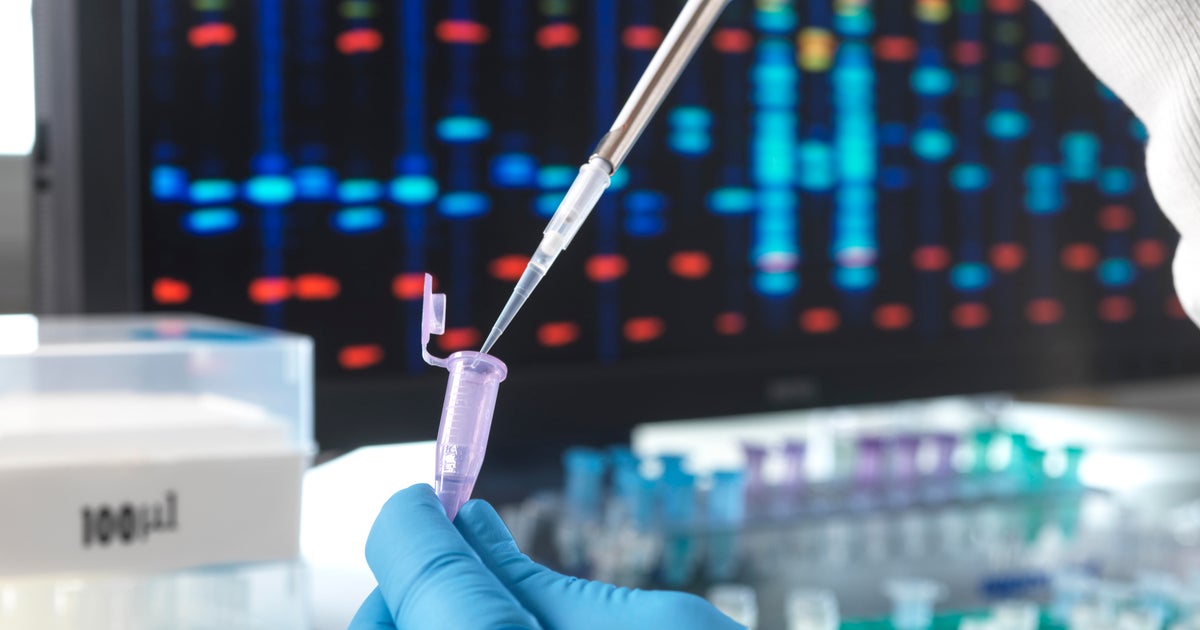“Do you have a family history of that?”
It’s a question that often comes up in health settings, but how much do genetics really impact your physical and mental health?
“Almost every condition you can think of has some sort of genetic basis, but the genetic basis is variable,” explains Dr. Eimear Kenny, professor of medicine and genetics and founding director of the Institute for Genomic Health. “For some conditions, you can point to specific genetic factors, and those genetic factors usually explain the majority of the reason why you have this condition… but that’s only really the tip of the iceberg.”
For other conditions, genetics may be a smaller piece of the puzzle. And it may vary in different cases.
For example, if you have high cholesterol, typically it’s due to a combination of your genetic predisposition, diet and other lifestyle factors — but for some, the genetic component can be stronger.
“For some people, about one in 200 people in the world, their high cholesterol actually has quite a large genetic component,” Kenny told CBS News. “There is a condition called familial hypercholesterolemia, which drives up cholesterol even at a very young age for genetic reasons.”
That’s why family history continues to be one of the “most important things in medicine,” Kenny says, because it can help you and your doctor determine your potential risk levels.
To better understand, we explored the top-searched questions about the genetic component of a number of common conditions.
Is diabetes genetic?
If your mom, dad, sister or brother has Type 2 diabetes, you could have prediabetes — higher-than-normal blood sugar levels — and are more likely to get Type 2 diabetes, according to the Centers for Disease Prevention and Control.
Kenny says there are also genetically driven types of diabetes, like MODY — Maturity-Onset Diabetes of the Young — which affects 1-2% of people with diabetes, but often goes unrecognized.
“It affects a very small minority of people, but that’s where there’s a strong genetic driver,” Kenny explains.
“For the rest of us, our genetic contribution to diabetes is the small piece of the pie relative to the social determinants of health. But there are so many individuals at the higher end of that risk, and individuals at the lower end of that risk and sometimes the individuals at the higher end of that risk can almost have equal risk to those rare genetic drivers.”
Even if you have a family history of diabetes, however, it is possible to prevent or delay Type 2 diabetes by making lifestyle changes, the CDC notes — steps like eating healthier, being physically active and maintaining a healthy weight. This is especially important if you have prediabetes, which can be reversed.
Is Alzheimer’s genetic?
In most cases, Alzheimer’s does not have a single genetic cause, according to the National Institutes of Health. Instead, the disease can be influenced by “multiple genes in combination with lifestyle and environmental factors.”
“Importantly, people who develop Alzheimer’s do not always have a history of the disease in their families,” the NIH’s website notes. “Still, those who have a parent or sibling diagnosed with the disease have a higher risk of developing Alzheimer’s than those without that association.”
Less than 5% of Alzheimer’s cases are actually inherited, explains Dr. Dale Bredesen, neuroscience researcher and neurodegenerative disease expert, though a range of estimates are recognized. For others, there’s no apparent link.
“So that 95% is sporadic, and that is to say, you can inherit a proclivity to it, but you’re not necessarily going to get it,” he says. “Just the 5% is related to three different genes,” known as the APP gene, Presenilin 1 and Presenilin 2. “In those cases, if you inherit that gene, typically you will get the disease.”
Within the 95% group, Bredesen says about two-thirds will have one gene in particular that increases or decreases risk for Alzheimers.
A well-known gene that influences Alzheimer’s risk is the apolipoprotein E, or APOE, gene, which comes in several different forms, or alleles. Of these alleles, APOE4 is understood to be the most significant genetic risk factor.
“The APOE gene is involved in making a protein that helps carry cholesterol and other types of fat in the bloodstream,” the NIH’s website explains. “Problems in this process are thought to contribute to the development of Alzheimer’s.”
Although APOE testing is available, results can’t fully predict who will or won’t develop Alzheimer’s. However, Bredesen still thinks it’s useful to “know your status” in order to assess your risk and take steps to protect your health.
“If you have a single copy of APOE4 — and that’s 75 million Americans — your lifetime risk goes up from 9% approximately to 30%. And if you have two copies, and that’s 7 million Americans, then it goes up to about 70%,” he explains.
But he stresses, “It’s important to note that this is just risk. It doesn’t mean that you’re going to get it, and in fact, there’s a tremendous amount you can do to make sure that you don’t get it.”
For example, research suggests that maintaining a healthy diet, keeping the mind and body active, and avoiding smoking and excess alcohol may help improve your odds.
Is bipolar disorder or schizophrenia genetic?
Studies have shown bipolar disorder, especially the most severe type, has a strong genetic component. And scientists are working to understand the apparent genetic risks of schizophrenia.
For mental health and neuro-psychiatric disorders, there are strong genetic drivers for a small number of people, Kenny says — but these can be more challenging to pin down.
“When we want to ask if your heart is healthy, we have a way to image the heart. We have a way to measure the thickness of your arteries. We can measure your heart rate, your blood pressure, your EKG — we have all this equipment,” she says. “But when we want to understand the picture of your mental health, we just have less accurate quantitative measures of that. So it’s a little bit more difficult to actually understand how genetics impacts that, too, but we’re making improvements.”
Is autism genetic?
Autism is another disorder that falls into the category of science “making improvements” towards understanding specific genetic drivers, Kenny says.
What experts do know is genetics, biology and environment are all important factors, according to the CDC.
“If someone in your family has autism spectrum disorder (ASD), you may be more likely to have a child with ASD,” the agency’s website says. “Having older parents, a difficult birth, or infections during pregnancy are all examples of factors that might increase the risk for having ASD.”
Autism is also complicated because it exists on a spectrum, explains Dr. Wendy Chung, chief of pediatrics at Boston Children’s Hospital and principal investigator of the autism-focused SPARK study.
At this time, genetic tests for people across the spectrum will only give about 10% of individuals a genetic answer that explains a major contributing factor to their autism, she says.
“Most of the people who are getting back that single genetic answer… are individuals who have either intellectual disabilities, epilepsy, other major medical problems. They tend to be individuals that are having more challenges in the sense of co-occurring conditions,” Chung says. Conversely, it’s more difficult for higher-functioning individuals to find genetic results through testing.
“That doesn’t mean there are not genetic contributors,” she says, “but based on our current knowledge… we can’t necessarily put our finger on them.”
Is ADHD genetic?
ADHD can also run in families, according to the Attention Deficit Disorder Association.
“The genes you inherit from your parents can significantly affect your risk of developing ADHD,” the association notes on its website. “Those with a parent, sibling, or close relative who has ADHD are more likely to have ADHD as well.”
In addition to genetics, scientists are studying other possible causes and risk factors for ADHD, including brain injury and exposure to a variety of environmental factors during pregnancy or at a young age, the CDC says.
“We are farther behind in terms of recognizing (genetic factors) for ADHD,” Chung says, in comparison to progress made with autism. “Thankfully, we have some better treatment, so it’s not quite as challenging as it is for autism.”
But, for people with co-occurring conditions, it can be easier to identify a genetic factor.
“For people with ADHD who also have epilepsy, as an example, it’s more likely there’s a recognizable genetic factor with that,” Chung explains, but adds more research is needed to better understand most of the causes of ADHD.
Why do genetic factors matter?
Understanding how genes play a role in the risk of certain conditions is key in helping with prevention, Kenny says.
One well-known example involves the BRCA1 and BRCA2 genes, where testing for specific mutations can show if someone is more predisposed to develop breast cancer and other cancers. But the results can still leave patients with many questions about their best course of action.
“About 25% of people who harbor a pathogenic variant in a BRCA1 or BRCA2 gene have an increased susceptibility to those associated cancers compared to everyone else,” she says, adding that she hopes for even better genomic screenings in the future.
“If (clinicians) know that you’re at increased risk, they can tailor your health management… to try and detect disease earlier or even before symptoms arise so that the mortality can be reduced or it even could be prevented.”













